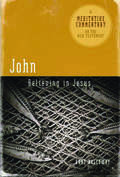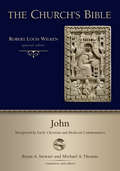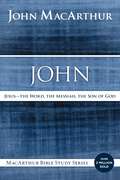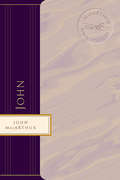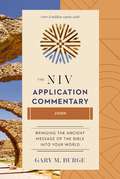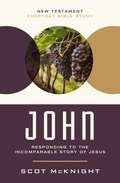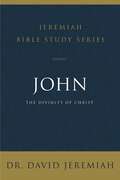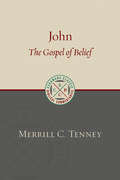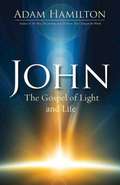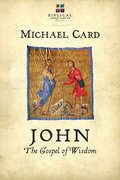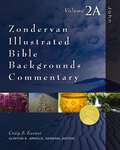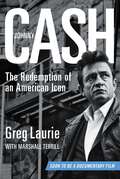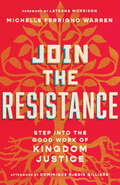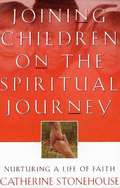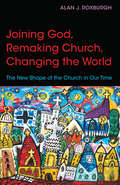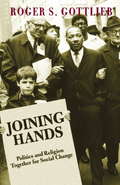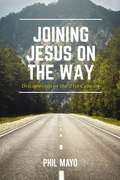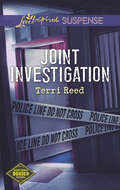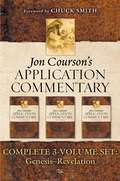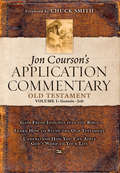- Table View
- List View
John: Believing in Jesus (Meditative Commentary #4)
by Gary HollowayThrough meditation on the Gospel of John, we experience the life of Jesus, the Word of God made flesh. Written by one who calls himself "the disciple whom Jesus loved," the Gospel of John paints an intimate portrait of Jesus as one who is intimate with God the Father, who calls disciples to follow him, and who gives signs that point his listeners to God.
John: Interpreted by Early Christian and Medieval Commentators (The Church's Bible)
by Bryan A. Stewart Michael A. ThomasThis Church&’s Bible volume on the Gospel of John contains carefully selected and translated homilies and commentaries from such church fathers as Cyril of Alexandria, Cyril of Jerusalem, Gregory the Great, Theodore of Mopsuestia, Augustine, Athanasius, and the Venerable Bede. Ranging chronologically from the second century to the ninth, these substantial patristic selections provide an illuminating window into the breadth of the church&’s interpretive tradition on John&’s Gospel.Authors of Works Excerpted Ambrose of Milan Ammonius of Alexandria AphrahatApostolic Constitutions Athanasius of Alexandria Augustine of Hippo Basil of Caesarea Bede Caesarius of Arles Clement of Alexandria Cyprian of Carthage Cyril of Alexandria Cyril of Jerusalem Didymus the Blind Ephrem the Syrian Gregory of Nazianzus Gregory of Nyssa Gregory the Great Hilary of Poitiers Hippolytus of Rome Irenaeus of Lyons Jerome John Cassian John Chrysostom John of Damascus John Scotus Eriugena Justin Martyr Leo the Great Maximus of Turin Novatian Origen of Alexandria Peter Chrysologus Romanos the Melodist Rufinus of Aquileia Severian of Gabala Sophronius of Jerusalem Tertullian of Carthage Theodore of Mopsuestia Theodoret of Cyrus Theophilus of Alexandria
John: Interpreted by Early Christian and Medieval Commentators (The Church's Bible)
by Bryan A. Stewart Michael A. ThomasThis Church&’s Bible volume on the Gospel of John contains carefully selected and translated homilies and commentaries from such church fathers as Cyril of Alexandria, Cyril of Jerusalem, Gregory the Great, Theodore of Mopsuestia, Augustine, Athanasius, and the Venerable Bede. Ranging chronologically from the second century to the ninth, these substantial patristic selections provide an illuminating window into the breadth of the church&’s interpretive tradition on John&’s Gospel.Authors of Works Excerpted Ambrose of Milan Ammonius of Alexandria AphrahatApostolic Constitutions Athanasius of Alexandria Augustine of Hippo Basil of Caesarea Bede Caesarius of Arles Clement of Alexandria Cyprian of Carthage Cyril of Alexandria Cyril of Jerusalem Didymus the Blind Ephrem the Syrian Gregory of Nazianzus Gregory of Nyssa Gregory the Great Hilary of Poitiers Hippolytus of Rome Irenaeus of Lyons Jerome John Cassian John Chrysostom John of Damascus John Scotus Eriugena Justin Martyr Leo the Great Maximus of Turin Novatian Origen of Alexandria Peter Chrysologus Romanos the Melodist Rufinus of Aquileia Severian of Gabala Sophronius of Jerusalem Tertullian of Carthage Theodore of Mopsuestia Theodoret of Cyrus Theophilus of Alexandria
John: Jesus - The Word, the Messiah, the Son of God (MacArthur Bible Studies)
by John F. MacArthurThe Gospel of John is filled with profound truths and rich spiritual stories. Stories of Christ's miracles that inspire His followers; stories of a death that redeems the lost; and stories of a resurrection that provides us with hope for eternal glory. Pastor John MacArthur will take you through the fourth gospel account, passage by passage, so that you can better understand everything from its unique and urgent tone to the ways the apostle John makes his case for Christ's sovereignty and victory.Every miracle, teaching, and action of Jesus that his disciple John captures in his Gospel has one clear purpose: to prove that Jesus is the Word, the Messiah, and the Son of God.The dramatic milestones of Christ's ministry, as portrayed by John, have invited millions of believers throughout the ages into a saving faith with Jesus Christ, and will lead you into a deeper understanding of the ultimate story of Jesus, the Son of God.—ABOUT THE SERIES—The MacArthur Bible Study series is designed to help you study the Word of God with guidance from widely respected pastor and author John MacArthur. Each guide provides intriguing examinations of the whole of Scripture by examining its parts and incorporates:Extensive, but straight-forward commentary on the text.Detailed observations on overriding themes, timelines, history, and context.Word and phrase studies to help you unlock the broader meaning and apply it to your life.Probing, interactive questions with plenty of space to write down your response and thoughts.
John: Jesus ?The Word, the Messiah, the Son of God (MacArthur Bible Studies)
by John MacarthurThese study guides, part of a 16-volume set from noted Bible scholar John MacArthur, take readers on a journey through biblical texts to discover what lies beneath the surface, focusing on meaning and context, and then reflecting on the explored passage or concept. With probing questions that guide the reader toward application, as well as ample space for journaling, The MacArthur Bible Studies are an invaluable tool for Bible Students of all ages.
John: John (The NIV Application Commentary)
by Gary M. BurgeThe NIV Application Commentary helps you communicate and apply biblical text effectively in today's context.The Gospel of John tells us the story that is the foundation of the distinctive teaching of Christianity. It provides all the elements necessary to see the full picture of the person and work of Jesus: a human Christ to redeem us, a divine Christ to reveal God's nature, and a powerful, Spirit-filled Christ to help us lead holy lives. This commentary unveils, in today's terminology, the deeply satisfying portrait of Christ painted in the Gospel of John. To bring the ancient messages of the Bible into today's context, each passage is treated in three sections:Original Meaning. Concise exegesis to help readers understand the original meaning of the biblical text in its historical, literary, and cultural context.Bridging Contexts. A bridge between the world of the Bible and the world of today, built by discerning what is timeless in the timely pages of the Bible.Contemporary Significance. This section identifies comparable situations to those faced in the Bible and explores relevant application of the biblical messages. The author alerts the readers of problems they may encounter when seeking to apply the passage and helps them think through the issues involved.This unique, award-winning commentary is the ideal resource for today's preachers, teachers, and serious students of the Bible, giving them the tools, ideas, and insights they need to communicate God's Word with the same powerful impact it had when it was first written.
John: Responding to the Incomparable Story of Jesus (New Testament Everyday Bible Study Series)
by Scot McKnightBecome a daily Bible reader, attentive to the mind of God."Scot McKnight is one of my absolute favorite New Testament scholars and his Everyday Bible Study series is akin to Einstein creating a user-friendly version of the Theory of Relativity!"—Lisa Harper, award-winning author and Bible teacherIn the New Testament Everyday Bible Study Series, widely respected biblical scholar Scot McKnight reveals the newness and activeness of God's Word as it works in our everyday lives. His unique approach to Bible study combines sound theology with relevant pastoral wisdom. Each volume of this series provides:Original Meaning: Brief, precise expositions of the biblical text and offers a clear focus for the central message of each passage.Fresh Interpretation: Brings the passage alive with fresh images and what it means to follow King Jesus.Practical Application: Biblical connections and questions for reflection and application for each passage. Ideal for personal reflection or group study, John will help you see God in the biblical context so you can hear from God in your context. John's Gospel highlights how people responded to Jesus in the first century but also showcases responses for readers today: faith that abides in who he is, obeys what he calls us to do, and witnesses about Jesus to the world.Who Jesus is and who we understand him to be shape how we respond to Jesus and the kind of person we are created to become.Scot McKnight will walk you and your group through John with Scripture passages (sometimes translated from the original by McKnight himself), reflection questions, pastoral insights, and ideas for putting God's words into action.
John: The Divinity of Christ (Jeremiah Bible Study Series)
by Dr. David JeremiahJesus came to give us life...Follow Dr. Jeremiah through the book of John in a chapter-by-chapter study that will help you understand what it meant to the people at the time it was written, and what it means to Christians today. As one of Jesus' closest disciples, John's gospel account gives us a unique glimpse into the significance of the life, death, and resurrection of Christ. John reveals how Jesus came to provide "living water" to quench our deep spiritual thirst for the things of God. He shows how Jesus is the "bread of life" who satisfies our deep spiritual hunger. And he reveals how Jesus is the only way we can obtain that eternal life.Each of this study's twelve lessons is clearly organized to include:Getting Started: An opening question to introduce you to the lesson.Setting the Stage: A short reflection to explain the context of the study.Exploring the Text: The Scripture reading for the lesson with related study questions.Reviewing the Story: Questions to help you identify key points in the reading.Applying the Message: Questions to help you apply the key ideas to their lives.Reflecting on the Meaning: A closing reflection on the key teachings in the lesson.—ABOUT THE SERIES—The Jeremiah Bible Study Series captures Dr. David Jeremiah's forty-plus years of commitment in teaching the Word of God. In each study, you'll gain insights into the text, identify key stories and themes, and be challenged to apply the truths you uncover to your life. By the end of each study, you'll come away with a clear and memorable understanding of that Bible book.
John: The Gospel of Belief: An Analytic Study of the Text (Eerdmans Classic Biblical Commentaries)
by Merrill C. TenneyOriginally published in 1948, this now-classic study by Merrill Tenney treats the Gospel of John as a literary unit and provides a straightforward analysis of the text. <P><P>Tenney first outlines the structure of the Gospel, then offers a careful exposition of John’s text according to six major periods of Christ’s life, and finally presents a topical analysis of the Gospel. <P><P>Not a critical commentary but, rather, a well-organized guidebook complemented by helpful charts and diagrams, Tenney’s John: The Gospel of Belief, reissued in this new format, will continue helping pastors, teachers, students, and other Bible readers grasp the aim and major themes of John.
John: The Gospel of Belief: An Analytic Study of the Text (Eerdmans Classic Biblical Commentaries)
by Merrill C. TenneyOriginally published in 1948, this now-classic study by Merrill Tenney treats the Gospel of John as a literary unit and provides a straightforward analysis of the text. Tenney first outlines the structure of the Gospel, then offers a careful exposition of John&’s text according to six major periods of Christ&’s life, and finally presents a topical analysis of the Gospel. Not a critical commentary but, rather, a well-organized guidebook complemented by helpful charts and diagrams, Tenney&’s John: The Gospel of Belief, reissued in this new format, will continue helping pastors, teachers, students, and other Bible readers grasp the aim and major themes of John.
John: The Gospel of Light and Life (John series)
by Adam HamiltonThe Gospel of John is the most deeply spiritual of the four gospels. This writing is filled with rich images and profound truths, but John notes that his aim in writing the gospel is that readers will not only believe in Jesus Christ, but that they "may have life in his name." Adults, youth, and children alike can experience a season of spiritual growth and life-changing renewal in Adam Hamilton’s six-week, DVD-series, John: The Gospel of Light and Life. You’ll follow the life, ministry, death, and resurrection of Jesus through the Gospel of John and understand the context of some of the best-known verses in the New Testament. Everything you need to lead small groups of all ages is available for this special study including the entire Gospel of John in the CEB translation printed in the book.
John: The Gospel of Wisdom (The Biblical Imagination Series)
by Michael Card"When the Spirit of truth comes, He will guide you into all the truth." - John 16:13 "He who saw this has testified so that you also may believe. His testimony is true, and he knows he is telling the truth." - John 19:35 With time and experience comes wisdom. John, the longest-surviving of the apostles, recorded in his Gospel a portrait of Jesus that displays the depth of years of reflection on who Jesus is and what he means to the world. Writing in light of the philosophies of his day, John describes Jesus as the incarnate Word, the divine Logos, the embodiment of all truth and wisdom. In this last volume of the Biblical Imagination Series, Michael Card completes his work on the four Gospels. He shows how John stands alongside the other Gospel writers to fill out the picture of Jesus' divine identity, with stories and sayings of Jesus not recorded by the others. This Jesus reorients our understanding of ourselves and the world around us, offering us nothing less than the way, the truth and the life. Like John before him, Card has written these words so that we may better believe that Jesus is the Messiah, the Son of God, and that by believing we have life in his name.
John: Volume 2A (Zondervan Illustrated Bible Backgrounds Commentary)
by Craig S. KeenerBrimming with lavish, full-color photos and graphics, the Zondervan Illustrated Bible Backgrounds Commentary walks you verse by verse through all the books of the New Testament. It's like slipping on a set of glasses that lets you read the Bible through the eyes of a first-century reader! Discoveries await you that will snap the world of the New Testament into gripping immediacy. Things that seem mystifying, puzzling, or obscure will take on tremendous meaning when you view them in their ancient context. You'll deepen your understanding of the teachings of Jesus. You'll discover the close, sometimes startling interplay between God's kingdom and the practical affairs of the church. Best of all, you'll gain a deepened awareness of the Bible's relevance for your life. Written in a clear, engaging style, this beautiful set provides a new and accessible approach that more technical expository and exegetical commentaries don't offer.Features include:Commentary based on relevant papyri, inscriptions, archaeological discoveries, and studies of Judaism, Roman culture, Hellenism, and other features of the world of the New TestamentHundreds of full-color photographs, color illustrations, and line drawingsCopious maps, charts, and timelinesSidebar articles and insights"Reflections" on the Bible's relevance for 21st-century living
Johnny Cash: The Redemption of an American Icon
by Greg LaurieJoin Greg Laurie, pastor and bestselling author of Steve McQueen: The Salvation of an American Icon, as he takes you on a personal journey into the life and legend of Johnny Cash. At the peak of his career, Cash had done it all—living the ultimate rags-to-riches story of growing up on a cotton farm in the Deep South to becoming a Nashville and Hollywood sensation, singing alongside heroes like Elvis Presley and performing for several American presidents. But through all of this, Cash was troubled. By the time he released the iconic Man in Black album in 1971, the middle-aged icon was broken down, hollow-eyed, and wrung out. In his search for peace, Cash became embroiled in controversy. He was arrested five times in seven years. His drug- and alcohol-induced escapades led to car accidents and a forest fire that devastated 508 acres. His time was divided between Jesus and jail, gospel tunes and the “Cocaine Blues.” But by the end of his life, Cash was speaking openly about his “unshakeable faith.” What caused the superstar to turn from his conflicting passions to embrace a life in Christ? Johnny Cash: The Redemption of an American Icon dives deep into the singer’s inner demons, triumphs, and gradual return to faith. Laurie interviews Cash’s family, friends, and business associates to reveal how the singer’s true success came through finding the only Person whose star was bigger than his own.
Join the Resistance: Step into the Good Work of Kingdom Justice
by Michelle Ferrigno WarrenAn awakening has been happening across our society.Faith-rooted justice advocate and activist Michelle Ferrigno Warren equips Christians to join Christ's restorative work in the world. In nearly three decades of experience, she left much of her privilege to work alongside the poor and marginalized in the restoration of individuals and communities, collaborating with community leaders, marching in streets, and meeting with and speaking truth to power. She says, "How you show up is just as important as showing up." From the grassroots to the grass tops, Warren invites us to understand our place in this moment and learn from those who have gone before: the poets and prophets who call us to resist oppression and injustice.Biblical, historical, and contemporary examples give us ways to walk in God's righteousness, truth, and peace. We can better understand our shared solidarity, persevere in the midst of struggle, bring people along, and remain rooted in joy as we continue the good work of kingdom justice.
Joining Children on the Spiritual Journey: Nurturing a Life of Faith
by Catherine StonehouseUnderstanding how a child's faith forms is crucial to knowing how adults can most significantly enhance the child's spiritual development. This book provides parents, teachers, and Christian education leaders with valuable insights into spiritual formation during childhood. With a biblical perspective as a starting point and a recognition of the crucial role of both the family and the faith community, Stonehouse reviews important contributions from noted child development experts Erik Erikson, Jean Piaget, Lawrence Kohlberg, and James Fowler. This overview gives insight into the processes of psychosocial, cognitive, and moral development in children and adolescents. Stonehouse concludes with solid guidelines for designing children's ministries. By carefully "setting the stage" through liturgy, sacred stories, and parables, Christian educators can help children meet with God. Quiet times of "godly play," carefully adapted to the age level of the child, enable adults to join with children on the journey toward deeper intimacy with God.
Joining God, Remaking Church, Changing the World: The New Shape of the Church in Our Time
by Alan J RoxburghChurch has changed—this book shows how to follow the Spirit out into the community, and reimagine our mission for the 21st century. The decline in mainstream religious denominations is palpable. For years, the question has been: How can we “fix” the church? With thirty years of experience pastoring congregations in small towns, suburbs, and urban neighborhoods in renewal, Alan J. Roxburg knows that the answer is to instead, embrace the church, reinvigorate communities with the Holy Spirit, and re-engage our neighbors with the mission of God. In this timely perspective on the role of the church in today’s environment, he shows how each one of us can become a leader in that mission. Roxburg distills the best missional wisdom for both clergy and laity alike, and offers concrete steps in transforming individual congregations and society. He sheds light on the troubling history that brought us to this point, and how ecumenically and globally we can implement the simple but necessary steps to build from it. An urgent call for Christians to guide any church—large or small—to becoming a vital center for a new spirituality, Joining God is an invitation “to embark on the journey you always wanted to take” (Philip Clayton, scholar, activist and author of Transforming Christian Theology).
Joining Hands
by Roger S. GottliebMany religious people believe that faith enables them to live more fully, joyously, and compassionately and makes their communities more likely to value and sustain life; many people in progressive politics believe a political response to the human condition is not just about satisfying some particular interest group, but is vital to the happiness of the entire human community. Gottlieb (philosophy, Worcester Polytechnic Institute) says both are right, but then again, both are wrong. He believes both are necessary to create the vision they share. Annotation c. Book News, Inc. , Portland, OR (booknews. com)
Joining Hands
by Roger S. GottliebDid Martin Luther King's spiritual understanding of political struggle truly help the Civil Rights movement? Can breast cancer victims incorporate both spiritual wisdom and political action in their fight for life? Confronting questions that challenge the foundations of both politics and spirituality, Roger S. Gottlieb presents a brave new account of how religious ethics and progressive movements share a common vision of a transformed world. In doing so, he offers a bold and eloquent affirmation: that authentic religion requires an activist, transforming presence in the political world, and that the moral and psychological insights of religion are indispensable resources in political struggles for democracy, human rights and ecological sanity. With original and compelling interpretations of Martin Luther King and the civil rights struggle, feminism, disability rights, the global environmental movement, and the fight for breast cancer, Joining Hands will alter the way spiritual seekers, political activists, and society as a whole think about the political role of religion and the spiritual component of politics.
Joining Hands
by Roger S. GottliebDid Martin Luther King's spiritual understanding of political struggle truly help the Civil Rights movement? Can breast cancer victims incorporate both spiritual wisdom and political action in their fight for life? Confronting questions that challenge the foundations of both politics and spirituality, Roger S. Gottlieb presents a brave new account of how religious ethics and progressive movements share a common vision of a transformed world. In doing so, he offers a bold and eloquent affirmation: that authentic religion requires an activist, transforming presence in the political world, and that the moral and psychological insights of religion are indispensable resources in political struggles for democracy, human rights and ecological sanity. With original and compelling interpretations of Martin Luther King and the civil rights struggle, feminism, disability rights, the global environmental movement, and the fight for breast cancer, Joining Hands will alter the way spiritual seekers, political activists, and society as a whole think about the political role of religion and the spiritual component of politics.
Joining Hands
by Roger S. GottliebDid Martin Luther King's spiritual understanding of political struggle truly help the Civil Rights movement? Can breast cancer victims incorporate both spiritual wisdom and political action in their fight for life? Confronting questions that challenge the foundations of both politics and spirituality, Roger S. Gottlieb presents a brave new account of how religious ethics and progressive movements share a common vision of a transformed world. In doing so, he offers a bold and eloquent affirmation: that authentic religion requires an activist, transforming presence in the political world, and that the moral and psychological insights of religion are indispensable resources in political struggles for democracy, human rights and ecological sanity. With original and compelling interpretations of Martin Luther King and the civil rights struggle, feminism, disability rights, the global environmental movement, and the fight for breast cancer, Joining Hands will alter the way spiritual seekers, political activists, and society as a whole think about the political role of religion and the spiritual component of politics.
Joining Jesus on the Way: Discipleship in the 21st Century
by Phil MayoWhat does it mean to &‘take up your cross daily&’? &“Sell your possessions and give to the poor&”--really!? &“Deny yourself,&” Jesus says. How does all of this fit together in a world two thousand years removed?Joining Jesus on the Way, takes a look at the discipleship teachings of Jesus through the lens of the Gospel of Luke. Luke&’s unique emphasis on discipleship has long been recognized among the Gospel traditions. One might even call Luke&’s Gospel a discipleship manual. In Luke, Jesus prepares his disciples for the power packed ministry they will live out in Luke&’s second volume, Acts.Jesus teaches his disciples about self-denial, obedience to his commands, proper attitude toward possessions, faith and prayer, and, after his resurrection, promises them the presence and power of the Holy Spirit to continue the ministry he began.Most of Jesus&’ discipleship teachings are found in the &“travel narrative&” portion of the Gospel of Luke. In these ten chapters, Jesus is traveling up to Jerusalem and his ultimate destiny, the cross. This is a journey on which Jesus invites all would-be disciples to join him. On the way, we learn what it means to be true followers of Jesus. The ultimate goal of the journey is the cross, which every disciple must bear, but the journey does not end here. Death to self means resurrection to new life in Christ.Two thousand years later, Jesus is still calling his followers to join him on the way, but we don&’t always know how to answer that call. It&’s not necessarily our fault, as we seem to hear very little these days about true discipleship. Some are answering the call but don&’t know what to do next. Their pursuit of Jesus is avid, but they need someone to help them along the way. This book is written to be that help.In Joining Jesus on the Way, Mayo considers the implications of Jesus&’ discipleship teachings for would-be disciples both then and now. This book is written to challenge 21st century believers to deepen their walk with Jesus, and to choose to take up that proverbial cross and follow him daily.
Joint Investigation (Northern Border Patrol #2)
by Terri ReedAn FBI agent teams with a Canadian Mountie to track a serial killer in this inspirational romantic suspense mystery.Under other circumstances, FBI agent Samantha Bennett might welcome a bit of backup—but not from an overprotective Mountie. She’s been on the trail of a serial killer for six months and no one has ever taken the case seriously . . . until now. When Royal Canadian Mounted Police inspector Drew Kelley saves her life, he decides that the hunt for “Birdman” is his problem, too. Together they begin a cross-continent chase to stop the madman before he strikes again. However, Samantha fears her growing feelings for the lawman may weaken her focus, or worse—put Drew directly in the killer’s sights . . . Northern Border Patrol: Keeping the US–Canadian border safe
Jon Courson's Application Commentary: 3-Volume Set (New Testament, Old Testament Genesis-Job, Old Testament Psalms-Malachi)
by Jon CoursonA complete devotional commentary set that helps you gain fresh insights into the Bible and understand how you can apply God&’s Word to your life. Few Bible commentators simultaneously articulate both insightful spiritual truths and memorable life applications for readers who want to be relevant witnesses for Jesus Christ. Gifted Bible preacher and inspiring teacher Jon Courson effortlessly combines these elements in this easy-to-read, verse-based devotional commentary 3-volume set.Pastor Jon's years of immersion in God's Word, as he regularly preached from the Bible, produced faithful, valuable teaching that takes a balanced approach between a scholarly work and an encouragement for living the Christian life. His application commentaries combine the following elements in a unique blend of pertinent information and needed inspiration:Deep love for God's wordColorful cultural insightsInsightful historical informationApplicable topical studiesVivid illustrations and storiesHumorous, practical, and inspiring life lessons The three volumes of this devotional commentary offer thorough and comprehensive teaching on every paragraph in the Bible along with practical, in-depth topical studies. Courson has amassed a wealth of understanding in a very readable and comfortable expositional style.Volumes include:Volume 1, Old Testament, (Genesis-Job)Volume 2, Old Testament (Psalms - Malachi)Volume 3, New Testament (Matthew - Revelation)
Jon Courson's Application Commentary: Volume 1, Old Testament, (Genesis-Job)
by Jon CoursonA devotional commentary that helps you gain fresh insights into the Bible and understand how you can apply God's Word to your life.Few Bible commentators simultaneously articulate both insightful spiritual truths and memorable life applications for readers who want to be relevant witnesses for Jesus Christ. Gifted Bible preacher and inspiring teacher Jon Courson effortlessly combines these elements in this easy-to-read, verse-based devotional commentary on the Old Testament books of Genesis through Job.Pastor Jon's years of immersion in God's Word, as he regularly preached from the Bible, produced faithful, valuable teaching that takes a balanced approach between a scholarly work and an encouragement for living the Christian life. His application commentaries combine the following elements in a unique blend of pertinent information and needed inspiration:Deep love for God's wordColorful cultural insightsInsightful historical informationApplicable topical studiesVivid illustrations and storiesHumorous, practical, and inspiring life lessons Jon Courson's devotional commentaries offer thorough and comprehensive teaching along with practical, in-depth topical studies in a very readable and comfortable expositional style.
